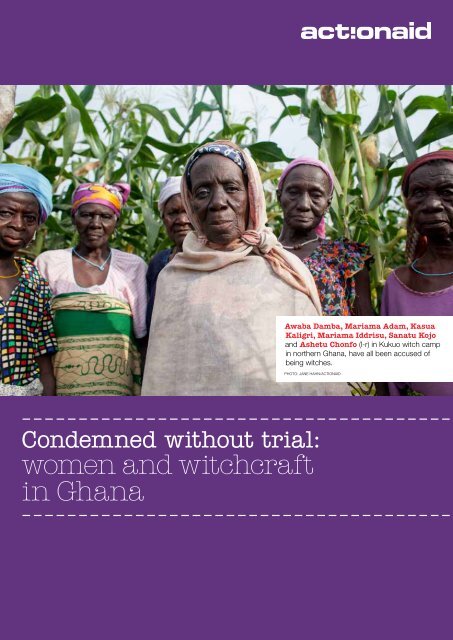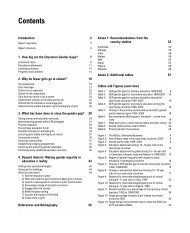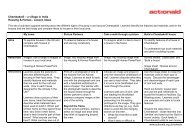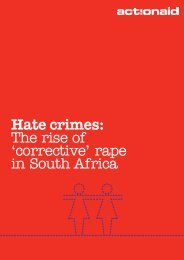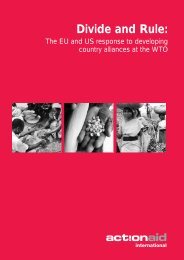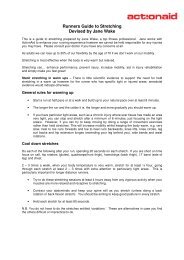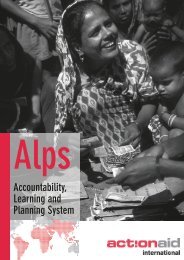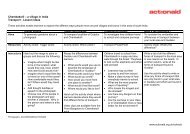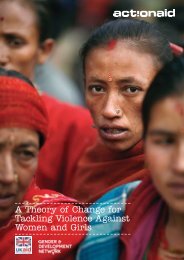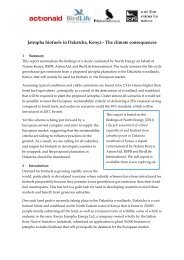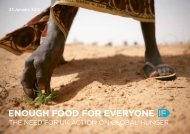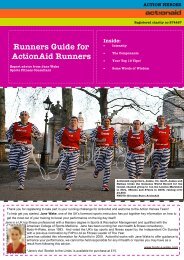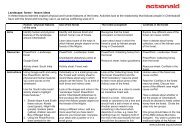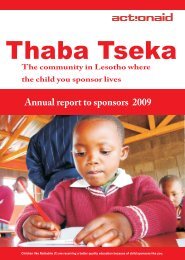women and witchcraft in Ghana - ActionAid
women and witchcraft in Ghana - ActionAid
women and witchcraft in Ghana - ActionAid
Create successful ePaper yourself
Turn your PDF publications into a flip-book with our unique Google optimized e-Paper software.
We’re <strong>ActionAid</strong>. We’re people who are<br />
dedicated to end<strong>in</strong>g the extreme poverty<br />
that kills 28 children every m<strong>in</strong>ute of every day.<br />
We’re a charity <strong>and</strong> much more. We’re a<br />
partnership between people <strong>in</strong> poor countries<br />
<strong>and</strong> people <strong>in</strong> rich countries – all work<strong>in</strong>g<br />
together to end poverty for good.<br />
<strong>ActionAid</strong> UK<br />
Hamlyn House<br />
Macdonald Road<br />
London N19 5PG<br />
United K<strong>in</strong>gdom<br />
Telephone<br />
+44 (0)20 7561 7561<br />
Facsimile<br />
+44 (0)20 7272 0899<br />
Email<br />
mail@actionaid.org.uk<br />
Website<br />
www.actionaid.org.uk<br />
Awaba Damba, Mariama Adam, Kasua<br />
Kaligri, Mariama Iddrisu, Sanatu Kojo<br />
<strong>and</strong> Ashetu Chonfo (l-r) <strong>in</strong> Kukuo witch camp<br />
<strong>in</strong> northern <strong>Ghana</strong>, have all been accused of<br />
be<strong>in</strong>g witches.<br />
PHOTO: Jane Hahn/<strong>ActionAid</strong><br />
International Secretariat<br />
Johannesburg<br />
Asia Region Office<br />
Bangkok<br />
Africa Region Office<br />
Nairobi<br />
<strong>women</strong> <strong>and</strong> <strong>witchcraft</strong><br />
Americas Region Office<br />
Rio De Janeiro<br />
Europe Office<br />
Brussels<br />
<strong>in</strong> <strong>Ghana</strong><br />
If you require this publication <strong>in</strong> a large pr<strong>in</strong>t format please<br />
contact us on +44 (0)1460 23 8000. All publications are<br />
available to download from our website: actionaid.org.uk<br />
Condemned without trial:<br />
Pr<strong>in</strong>ted on recycled paper by a pr<strong>in</strong>ter hold<strong>in</strong>g <strong>in</strong>ternationally recognised<br />
environmental accreditation ISO 14001. Please remember to recycle<br />
this item when you have f<strong>in</strong>ished with it.<br />
<strong>ActionAid</strong> is a registered charity no. 274467.
3 Condemned without trial<br />
Executive summary<br />
In northern <strong>Ghana</strong> hundreds of <strong>women</strong> accused of <strong>witchcraft</strong> by relatives or members of their community<br />
are liv<strong>in</strong>g <strong>in</strong> ‘witch camps’ after flee<strong>in</strong>g or be<strong>in</strong>g banished from their homes.<br />
The camps, which are home to around 800 <strong>women</strong> <strong>and</strong> 500 children, offer poor liv<strong>in</strong>g conditions <strong>and</strong><br />
little hope of a normal life. The <strong>women</strong> have fled discrim<strong>in</strong>ation, threats or even mob justice after be<strong>in</strong>g<br />
accused of <strong>witchcraft</strong> <strong>and</strong> blamed for ‘crimes’ such as caus<strong>in</strong>g sickness, droughts or fires, curs<strong>in</strong>g a<br />
neighbour or even just appear<strong>in</strong>g <strong>in</strong> someone’s dream.<br />
Those who reach the witch camps are the lucky ones. Women have been murdered after accusations of<br />
<strong>witchcraft</strong>. Recently a mother of three was beaten <strong>and</strong> set on fire after be<strong>in</strong>g blamed for mak<strong>in</strong>g a child<br />
sick through <strong>witchcraft</strong>. 1 In 2010, the case of a 72-year-old woman who was set on fire <strong>and</strong> killed made<br />
headl<strong>in</strong>es around the world. 2<br />
Some elderly <strong>women</strong> have lived <strong>in</strong> the camps for as long as 40 years – ab<strong>and</strong>oned by their families <strong>and</strong><br />
trapped <strong>in</strong> the camps until they die. Their only companions are young girls, often gr<strong>and</strong>daughters or<br />
family members, who were sent with the <strong>women</strong> as ‘attendants’. Most of these girls have never gone to<br />
school, or have dropped out, <strong>and</strong> even when they reach the age when they could leave the camps, they<br />
usually cannot because they are ta<strong>in</strong>ted by the word ‘witch’.<br />
In 2011 the <strong>Ghana</strong>ian government announced that the witch camps should be closed down as soon as<br />
2012. <strong>ActionAid</strong> is firmly aga<strong>in</strong>st the closure of the camps <strong>in</strong> such as short space of time, because<br />
although they can be seen as ghettos, the camps do provide a safe haven for <strong>women</strong> accused of<br />
<strong>witchcraft</strong>. The <strong>women</strong> themselves say they would prefer to stay <strong>in</strong> the camps rather than face<br />
discrim<strong>in</strong>ation or risk violence or death back home.<br />
<strong>ActionAid</strong> is lead<strong>in</strong>g an anti-witch camp campaign with the ultimate aim that all the <strong>women</strong> labelled as<br />
witches are able to leave the camps <strong>and</strong> be safely re<strong>in</strong>tegrated <strong>in</strong>to society. However the government<br />
must not rush <strong>in</strong>to disb<strong>and</strong><strong>in</strong>g the camps as this would leave the <strong>women</strong> even more vulnerable to attack.<br />
There is a widespread belief <strong>in</strong> <strong>witchcraft</strong> <strong>in</strong> <strong>Ghana</strong>, as <strong>in</strong> many other countries. Though both men <strong>and</strong><br />
<strong>women</strong> can be accused of <strong>witchcraft</strong>, the vast majority are <strong>women</strong>, especially the elderly.<br />
Women who do not fulfil expected gender stereotypes, for example if they are widows, unmarried or<br />
cannot have children, are vulnerable to be<strong>in</strong>g br<strong>and</strong>ed as witches. <strong>ActionAid</strong> believes the witch camps<br />
are a cruel manifestation of gender <strong>in</strong>equality <strong>and</strong> violence aga<strong>in</strong>st <strong>women</strong> <strong>in</strong> <strong>Ghana</strong>, as well as a denial of<br />
the rights of the <strong>women</strong> <strong>and</strong> girls who live there.<br />
The camps only exist <strong>in</strong> the northern region of <strong>Ghana</strong>, where poverty levels are far higher than other areas<br />
of the country. <strong>ActionAid</strong> has been work<strong>in</strong>g <strong>in</strong> the camps s<strong>in</strong>ce 2005 to provide basic services such as<br />
food, water, shelter <strong>and</strong> education. In recent years the focus is also on enabl<strong>in</strong>g the <strong>women</strong> to organise<br />
themselves, learn about their rights <strong>and</strong> fight for improved services <strong>and</strong> access to social benefits. They<br />
now feel self-confident enough to be lead<strong>in</strong>g the campaign to prevent the immediate closure of the<br />
camps, through marches, media engagement <strong>and</strong> community education.
4 Condemned without trial<br />
Conditions <strong>in</strong> the camps<br />
“A lot of the <strong>women</strong> leave with absolutely noth<strong>in</strong>g, sometimes not even<br />
slippers on their feet <strong>and</strong> sometimes with wounds or bruises because<br />
they have been beaten.”<br />
Adwoa Kwateng-Kluvitse, <strong>ActionAid</strong> <strong>Ghana</strong> country director<br />
The six ‘witch camps’ of Gambaga, Kukuo, Gnani,<br />
Bonyase, Nabuli <strong>and</strong> Kpat<strong>in</strong>ga are located close<br />
to or even with<strong>in</strong> ‘ord<strong>in</strong>ary’ towns or villages <strong>and</strong><br />
all are <strong>in</strong> remote areas of northern <strong>Ghana</strong>. They<br />
are not fenced off but residents <strong>and</strong> those outside<br />
are very aware of where the camps’ boundaries lie.<br />
The camps consist ma<strong>in</strong>ly of mud huts with flimsy<br />
thatched roofs. Food supplies are <strong>in</strong>adequate <strong>and</strong>,<br />
<strong>in</strong> some camps, <strong>women</strong> have to walk several miles<br />
to collect water. Virtually no regular services are<br />
provided by the government or its agencies <strong>and</strong><br />
there are few basic health or education facilities.<br />
Even if these are available, the <strong>women</strong> cannot<br />
afford them.<br />
The <strong>women</strong> do not have a voice or representation<br />
<strong>in</strong> decid<strong>in</strong>g matters affect<strong>in</strong>g their lives. They are<br />
not allowed to attend village meet<strong>in</strong>gs (or prefer<br />
not to because of discrim<strong>in</strong>ation) <strong>and</strong> have little or<br />
no access to justice.<br />
“It’s not easy leav<strong>in</strong>g your home <strong>and</strong> com<strong>in</strong>g to<br />
live <strong>in</strong> a different environment without the support<br />
of your family, so first <strong>and</strong> foremost a woman <strong>in</strong><br />
the camp is very lonely,” says Lamnatu Adam,<br />
programme coord<strong>in</strong>ator at Songtaba (which<br />
means ‘let’s help each other’ <strong>in</strong> the local Dagbani<br />
dialect), a coalition work<strong>in</strong>g with alleged witches.<br />
“She loses the family support <strong>and</strong> she also loses<br />
that confidence <strong>in</strong> herself because once you are <strong>in</strong><br />
the camp your status changes. You are ashamed<br />
of the situation <strong>and</strong> that causes you to lose<br />
self-respect <strong>and</strong> to be traumatised.”<br />
Once a woman is accused of <strong>witchcraft</strong> she is<br />
often banished from her village by a mob which<br />
sometimes <strong>in</strong>cludes her relatives or children.<br />
“Most of the time the allegation of <strong>witchcraft</strong><br />
happens quite quickly,” says Adwoa Kwateng-<br />
Kluvitse, <strong>ActionAid</strong> <strong>Ghana</strong> country director. “A lot<br />
of the <strong>women</strong> leave with absolutely noth<strong>in</strong>g,<br />
sometimes not even slippers on their feet <strong>and</strong><br />
sometimes with wounds or bruises because they<br />
have been beaten.”<br />
When a woman arrives at a camp she is subjected<br />
to rituals <strong>in</strong>volv<strong>in</strong>g the slaughter of chickens to<br />
prove whether she is <strong>in</strong>nocent or guilty of the<br />
crime of which she is accused. This ‘purification<br />
ceremony’ is performed by camp chiefs or male<br />
priests known as T<strong>in</strong>danas, who are believed to<br />
possess supernatural powers <strong>and</strong> can ascerta<strong>in</strong><br />
the <strong>in</strong>nocence or guilt of the accused. They are<br />
also thought to be able to exorcise the <strong>witchcraft</strong><br />
spirit, <strong>and</strong> thus set the victim ‘free’.<br />
At Gambaga camp, the accused <strong>and</strong> the<br />
compla<strong>in</strong>ant both send a chicken to the shr<strong>in</strong>e<br />
which is then sacrificed to the gods. The<br />
<strong>in</strong>nocence or guilt of the accused is determ<strong>in</strong>ed<br />
by the f<strong>in</strong>al posture of the chicken as it dies. If it<br />
dies with its face down it means the accused is<br />
guilty of be<strong>in</strong>g a witch. If it dies face up she is<br />
<strong>in</strong>nocent. Sometimes the <strong>women</strong> are forced to<br />
dr<strong>in</strong>k a potentially fatal ‘cleans<strong>in</strong>g concoction’ that<br />
can <strong>in</strong>clude chicken blood <strong>and</strong> earth. Even if<br />
found <strong>in</strong>nocent, very few can return home<br />
because their communities will not accept them.<br />
Accord<strong>in</strong>g to local beliefs, the camps, some of<br />
which came <strong>in</strong>to existence as long as 100 years<br />
ago, are ‘safe places’ where <strong>witchcraft</strong> cannot be<br />
carried out, which is why the alleged witches can<br />
live there <strong>in</strong> safety. They are under the leadership<br />
of T<strong>in</strong>danas, or <strong>women</strong> leaders known as<br />
Magazias. The Magazias are also victims of<br />
<strong>witchcraft</strong> allegations <strong>and</strong> have been resident <strong>in</strong><br />
the camps for many years.<br />
Some camps, for example Gnani, have male<br />
residents who have been accused of wizardry.<br />
However most of the camps conta<strong>in</strong> only alleged<br />
witches <strong>and</strong> the total number of men <strong>in</strong> the camps<br />
is far lower than the number of <strong>women</strong>. This is<br />
because men are generally less vulnerable than<br />
<strong>women</strong> as they are economically better off <strong>and</strong><br />
more able to resist physical violence. This<br />
illustrates that vulnerability is a key underly<strong>in</strong>g<br />
factor <strong>in</strong> <strong>witchcraft</strong> accusations.
5 Condemned without trial<br />
“She loses the family support <strong>and</strong> she also loses that confidence <strong>in</strong> herself<br />
because once you are <strong>in</strong> the camp your status changes. You are ashamed of<br />
the situation <strong>and</strong> that causes you to lose self-respect <strong>and</strong> to be traumatised.”<br />
Lamnatu Adam, programme coord<strong>in</strong>ator at Songtaba, a coalition<br />
work<strong>in</strong>g with alleged witches<br />
Often <strong>women</strong> who are banished to the camps are<br />
‘given’ a young child – perhaps a gr<strong>and</strong>child <strong>and</strong><br />
almost always a girl – to help look after them. This<br />
happens <strong>in</strong> cases where the families of the<br />
accused still want to support them but cannot<br />
protect them <strong>in</strong> their own community. In other<br />
cases, where the accused woman is liv<strong>in</strong>g with a<br />
child <strong>in</strong> her village – for example an orphaned<br />
gr<strong>and</strong>child – the child is also banished to the<br />
camp.<br />
The girls <strong>in</strong> the camps suffer from huge violations<br />
of their rights. They too have limited access to<br />
food, shelter <strong>and</strong> education. Most do not attend<br />
school because school facilities are limited <strong>and</strong><br />
remote from the camps, <strong>and</strong> because they suffer<br />
stigmatisation <strong>and</strong> discrim<strong>in</strong>ation by their peers<br />
<strong>and</strong> sometimes their teachers. Most of their time<br />
is spent do<strong>in</strong>g household chores <strong>and</strong>, when they<br />
are older, some take paid labour sell<strong>in</strong>g wood or<br />
carry<strong>in</strong>g loads <strong>in</strong> order to support their<br />
gr<strong>and</strong>mothers.<br />
condemn the camps as a violation of the rights of<br />
the <strong>women</strong> who have to live <strong>in</strong> them. But the<br />
camps also provide a haven for accused <strong>women</strong>,<br />
<strong>and</strong>, <strong>in</strong> the absence of any social support <strong>and</strong><br />
protection <strong>in</strong> their own communities, can be a<br />
relatively safe place for <strong>women</strong> if the conditions<br />
are humane <strong>and</strong> dignified.<br />
Adwoa Kwateng-Kluvitse believes we have to<br />
recognise that if the camps were not there,<br />
<strong>women</strong> accused of <strong>witchcraft</strong> would be even<br />
more vulnerable. “Once they are <strong>in</strong> a camp,<br />
technically they are safe, nobody will attack an<br />
alleged witch <strong>in</strong> a witch camp so she is safe from<br />
be<strong>in</strong>g lynched or beaten. We know of cases<br />
where the family of an accused woman will take<br />
her to a camp to keep her safe from the young<br />
men <strong>in</strong> the community who would put her at risk<br />
by attack<strong>in</strong>g or beat<strong>in</strong>g her.”<br />
The witch camps are effectively <strong>women</strong>’s prisons<br />
where <strong>in</strong>mates have been given no trial, have no<br />
right of appeal but have received a life sentence.<br />
It is because of this that <strong>ActionAid</strong> <strong>and</strong> Songtaba<br />
Murder case<br />
A woman from the town of Jillig number 2, near Gambaga camp, was murdered<br />
after be<strong>in</strong>g blamed for the death of a child through <strong>witchcraft</strong>. The child was ill,<br />
<strong>and</strong> because one day a bat flew over it, a mob believed the illness had been caused<br />
by <strong>witchcraft</strong>. They found the woman, beat her until she was unconscious <strong>and</strong> then<br />
set her alight. She left three young children aged 11, 9 <strong>and</strong> 7.<br />
“These children have no mother <strong>and</strong> their father had already died,” said<br />
the town chief. “These children can no longer do anyth<strong>in</strong>g. They have no<br />
mother. They have no father. It has been left <strong>in</strong> my h<strong>and</strong>s to make sure they<br />
get some daily bread. We have these orphans without anyth<strong>in</strong>g to support<br />
them.”
6 Condemned without trial<br />
Belief <strong>in</strong> <strong>witchcraft</strong><br />
PHOTO: Vicky Markolefa/<br />
<strong>ActionAid</strong><br />
Asana’s story<br />
Asana, 27, was accused of be<strong>in</strong>g a witch by her ex-husb<strong>and</strong>, who beat her severely<br />
<strong>and</strong> poured melted plastic over her while she was pregnant. He accused her of be<strong>in</strong>g<br />
a witch after gett<strong>in</strong>g ill <strong>and</strong> dream<strong>in</strong>g that Asana was try<strong>in</strong>g to kill him. She fled to<br />
her mother’s house, but he followed her, beat<strong>in</strong>g not only Asana but also her elderly<br />
mother <strong>and</strong> younger brothers. Her new husb<strong>and</strong> said he couldn’t protect her so he<br />
took her to Gambaga camp to keep her ‘safe’.<br />
“When I first came here my whole body was <strong>in</strong> pa<strong>in</strong> because<br />
he first hit me <strong>and</strong> then they tried to burn me with melted<br />
plastic,” says Asana. “My ex- husb<strong>and</strong> knew I was pregnant.<br />
One day, when I was five months pregnant, while I was <strong>in</strong> the<br />
fields with other <strong>women</strong> he came after me <strong>and</strong> he beat me<br />
with no mercy. While I was on the ground he took out a knife.<br />
The other <strong>women</strong> were begg<strong>in</strong>g him to stop. After he beat me<br />
hard he stopped. He did not kill me at the end. I was taken to<br />
a shr<strong>in</strong>e. There, he melted plastic <strong>and</strong> poured it on my body.<br />
When I came here my whole body was <strong>in</strong> terrible pa<strong>in</strong>.”
7 Condemned without trial<br />
“Most religions believe <strong>in</strong> good <strong>and</strong> evil. The ma<strong>in</strong> issue is how people respond<br />
to this belief <strong>in</strong> <strong>witchcraft</strong>. It is to do with the way that society copes when<br />
misfortune hits – whether it is ill health, an accident, loss of jobs or property.”<br />
Professor Dzodzi Tsikata, University of <strong>Ghana</strong><br />
In <strong>Ghana</strong>, as <strong>in</strong> many other African countries,<br />
belief <strong>in</strong> <strong>witchcraft</strong> is widespread <strong>and</strong> entrenched.<br />
Witches <strong>and</strong> wizards are believed to possess<br />
<strong>in</strong>herent, supernatural powers that are used to<br />
create evil or misfortune. Sicknesses, the <strong>in</strong>ability<br />
to have children, accidents, the loss or destruction<br />
of property, droughts, floods <strong>and</strong> fires are among<br />
the events blamed on witches.<br />
Across Africa – <strong>in</strong> Nigeria, Kenya, Tanzania, South<br />
Africa, the Democratic Republic of Congo, Angola<br />
<strong>and</strong> the Central African Republic – <strong>women</strong> <strong>and</strong><br />
children are targeted as witches <strong>and</strong> suffer horrific<br />
abuse. The recent case of 15-year-old Kristy<br />
Bamu, killed <strong>in</strong> London by his sister <strong>and</strong> her<br />
partner because they believed he was a witch,<br />
shows that belief <strong>in</strong> <strong>witchcraft</strong> is present <strong>in</strong> the UK.<br />
But it is not limited to Africa or the African diaspora<br />
<strong>and</strong> belief <strong>in</strong> spirits is widespread throughout the<br />
world, <strong>in</strong>clud<strong>in</strong>g the practice of shamanism, wicca,<br />
voodoo <strong>and</strong> paganism among others.<br />
When the belief system leads to people be<strong>in</strong>g<br />
persecuted <strong>and</strong> abused it becomes problematic.<br />
Even an accusation, whether or not it is followed<br />
by violence or banishment, can be seen as<br />
psychological abuse. Songtaba <strong>and</strong> <strong>ActionAid</strong><br />
<strong>Ghana</strong> do not engage <strong>in</strong> discussions on the<br />
existence or otherwise of <strong>witchcraft</strong>. The focus of<br />
our campaign<strong>in</strong>g is on seek<strong>in</strong>g to uphold the rights<br />
of <strong>women</strong> who are accused of <strong>witchcraft</strong> <strong>and</strong> to<br />
help re<strong>in</strong>tegrate them <strong>in</strong>to their communities if they<br />
wish to return.<br />
Professor Dzodzi Tsikata, an expert <strong>in</strong><br />
development sociology at the University of <strong>Ghana</strong>,<br />
believes <strong>witchcraft</strong> is a way for people to expla<strong>in</strong><br />
misfortune. “Witchcraft accusations are thought of<br />
as mostly to do with traditional <strong>and</strong> ‘backwards’<br />
beliefs, but they are an <strong>in</strong>tegral part of belief <strong>in</strong><br />
religion. Most religions believe <strong>in</strong> good <strong>and</strong> evil.<br />
The ma<strong>in</strong> issue is how people respond to this<br />
belief <strong>in</strong> <strong>witchcraft</strong>. It is to do with the way that<br />
society copes when misfortune hits – whether it is<br />
ill health, an accident, loss of jobs or property.<br />
When people do not have a rational explanation for<br />
this they tend to use the supernatural to show that<br />
someone somewhere is responsible for this<br />
misfortune <strong>and</strong> to f<strong>in</strong>d a way of remov<strong>in</strong>g this<br />
person so they are no longer able to harm them.”<br />
Spiritual beliefs are also strongest <strong>in</strong> the poorest<br />
areas. Lamnatu Adam, of Songtaba, says it is no<br />
co<strong>in</strong>cidence that the witch camps are found only <strong>in</strong><br />
northern <strong>Ghana</strong>, which is one of the poorest<br />
regions of the country <strong>and</strong> suffers from low<br />
education <strong>and</strong> literacy st<strong>and</strong>ards. Accord<strong>in</strong>g to the<br />
UN, three-quarters of adults <strong>in</strong> northern <strong>Ghana</strong> are<br />
illiterate compared to 43% nationally. 3<br />
Poverty <strong>in</strong> <strong>Ghana</strong><br />
<strong>Ghana</strong> is often described as one of west Africa’s development success stories: the<br />
country’s growth <strong>and</strong> poverty reduction rates are among the very best <strong>in</strong> the region.<br />
S<strong>in</strong>ce 1991, <strong>Ghana</strong>’s poverty rate has dropped by almost half, while the proportion of<br />
people go<strong>in</strong>g hungry has been reduced by three quarters <strong>in</strong> the past two decades. Almost<br />
eight out of ten children, girls as well as boys, are now <strong>in</strong> school. <strong>ActionAid</strong> 4 research <strong>in</strong><br />
2011 showed that <strong>Ghana</strong> has reduced its dependency on foreign aid from 46% to 27%. 5<br />
However poverty rates <strong>in</strong> the country are uneven <strong>and</strong> the north is drought-prone <strong>and</strong><br />
offers far fewer economic opportunities than <strong>in</strong> the south. The northern regions have seen<br />
only slight decreases <strong>in</strong> poverty rates <strong>in</strong> recent years, which tend to be two to three times<br />
the national average.
8 Condemned without trial<br />
Witches, but not wizards<br />
Though both men <strong>and</strong> <strong>women</strong> can be accused of<br />
<strong>witchcraft</strong>, the vast majority are <strong>women</strong>, especially<br />
the elderly. Widows, childless or unmarried <strong>women</strong><br />
are vulnerable to be<strong>in</strong>g br<strong>and</strong>ed as witches as they<br />
do not fulfil expected gender stereotypes. In<br />
addition, widows <strong>and</strong> unmarried <strong>women</strong> usually<br />
have weak social protection systems – lack<strong>in</strong>g an<br />
<strong>in</strong>fluential person to support them. There is also a<br />
high correlation between the perceived noncontribution<br />
of <strong>women</strong> to the economic needs of<br />
the household <strong>and</strong> <strong>witchcraft</strong> allegation. 6<br />
An <strong>ActionAid</strong> survey of the witch camps <strong>in</strong> 2008<br />
found that <strong>in</strong> one camp – Kukuo – more than 70%<br />
of residents were accused <strong>and</strong> banished as<br />
witches after their husb<strong>and</strong>s died. In a patriarchal<br />
society, a woman without the protection of a father,<br />
husb<strong>and</strong>, or sometimes a brother, is extremely<br />
vulnerable to be<strong>in</strong>g labelled a witch. The survey<br />
also found that almost a third of the <strong>women</strong> <strong>in</strong><br />
Kukuo camp were not engaged <strong>in</strong> any form of<br />
economic activity before they were banished there.<br />
This implies that others see them as not ‘useful’ to<br />
their community.<br />
“The camps are a dramatic manifestation of the<br />
status of <strong>women</strong> <strong>in</strong> <strong>Ghana</strong>,” says Professor Dzodzi<br />
Tsikata. “The issue is l<strong>in</strong>ked to the whole issue of<br />
gender <strong>in</strong>equality <strong>in</strong> our country. When <strong>women</strong> are<br />
younger, more useful to society, they are <strong>in</strong> their<br />
child bear<strong>in</strong>g years, they are work<strong>in</strong>g <strong>and</strong> have a<br />
husb<strong>and</strong> <strong>and</strong> are conform<strong>in</strong>g to what society<br />
expects, then there is no problem <strong>and</strong> no one will<br />
accuse them of behaviour which might then be<br />
attributed to <strong>witchcraft</strong>. But most of those accused<br />
are older, usually they are widowed <strong>and</strong> no longer<br />
look<strong>in</strong>g after children <strong>and</strong> liv<strong>in</strong>g alone on the edge<br />
of society. Then they become a target because<br />
they are no longer useful to society <strong>and</strong> not<br />
conform<strong>in</strong>g to what people expect.”<br />
accused, as a way of tak<strong>in</strong>g away their wealth <strong>and</strong><br />
power.<br />
Lamnatu Adam says <strong>women</strong> who are outspoken<br />
are also often accused of be<strong>in</strong>g a witch. “Women<br />
are expected to be submissive <strong>and</strong> subord<strong>in</strong>ate,<br />
so once you are seen to be outspoken then it’s like<br />
someth<strong>in</strong>g is wrong with you, you might be<br />
possessed. So <strong>in</strong> order to elim<strong>in</strong>ate you, they just<br />
say someth<strong>in</strong>g like ‘I saw you <strong>in</strong> my dream <strong>and</strong> I<br />
th<strong>in</strong>k that you are a witch’.”<br />
Witchcraft accusations also stem from a lack of<br />
recognition or treatment for mental health issues.<br />
Accord<strong>in</strong>g to Dr Akwesi Osei, chief psychiatrist <strong>in</strong><br />
the <strong>Ghana</strong> Health Service <strong>and</strong> medical director at<br />
Accra Psychiatric Hospital, <strong>women</strong> who are<br />
accused of <strong>witchcraft</strong> are often suffer<strong>in</strong>g from<br />
cl<strong>in</strong>ical depression, schizophrenia or dementia:<br />
“In traditional communities, there isn’t an<br />
underst<strong>and</strong><strong>in</strong>g of depression or schizophrenia. If<br />
someone is behav<strong>in</strong>g strangely they may be<br />
accused <strong>and</strong> even confess all k<strong>in</strong>ds of crimes. In<br />
the camps you are likely to see a number of<br />
<strong>women</strong> suffer<strong>in</strong>g from dementia or depression.”<br />
“The witch camps are unacceptable because they<br />
are just for <strong>women</strong>,” says Patricia Akakpo, from<br />
NETRIGHT, a <strong>Ghana</strong>ian <strong>women</strong>’s rights network.<br />
“Men are not as vulnerable <strong>in</strong> society… What<br />
about men wizards – are they also go<strong>in</strong>g to send<br />
them from their communities or can they stay<br />
because they are men, because they are <strong>in</strong><br />
authority I th<strong>in</strong>k it is because of a patriarchal<br />
society <strong>and</strong> it is men that make the decision, when<br />
you go to the camps it’s men that rule over the<br />
<strong>women</strong>.”<br />
Accusations of <strong>witchcraft</strong> are a convenient excuse<br />
for the cruel treatment of <strong>women</strong> who are poor,<br />
excluded, different, or seen to be challeng<strong>in</strong>g the<br />
status quo. Very occasionally <strong>women</strong> who are<br />
economically successful <strong>and</strong> <strong>in</strong>dependent are
9 Condemned without trial<br />
Failed by laws<br />
Former alleged witch<br />
B<strong>in</strong>tugib Duut back<br />
home <strong>in</strong> Nakp<strong>and</strong>uri village,<br />
northern <strong>Ghana</strong>.<br />
PHOTO: Jane Hahn/<strong>ActionAid</strong><br />
Commission on Human Rights <strong>and</strong> Adm<strong>in</strong>istrative<br />
Justice (CHRAJ), the Domestic Violence <strong>and</strong><br />
Victim Support Unit (DOVVSU) <strong>and</strong> the National<br />
Commission for Civic Education (NCCE) all<br />
operate at the local level <strong>in</strong> <strong>Ghana</strong> to protect<br />
human rights, but many of these <strong>in</strong>stitutions have<br />
difficulty <strong>in</strong> fulfill<strong>in</strong>g their responsibilities because<br />
of a lack of technical expertise, capacity <strong>and</strong><br />
logistical support. Few people, particularly <strong>in</strong> rural<br />
areas, are aware that they can seek help from<br />
these <strong>in</strong>stitutions when they, or their relatives,<br />
experience violence or abuse after be<strong>in</strong>g accused<br />
of <strong>witchcraft</strong>.<br />
<strong>Ghana</strong>’s constitution ensures the rights of citizens<br />
<strong>and</strong> is further supported by <strong>in</strong>ternational laws <strong>and</strong><br />
conventions such as the African Charter on<br />
Human <strong>and</strong> Peoples’ Rights (ACHPR) <strong>and</strong> the<br />
Convention on the Elim<strong>in</strong>ation of All Forms of<br />
Discrim<strong>in</strong>ation aga<strong>in</strong>st Women (CEDAW), to which<br />
<strong>Ghana</strong> is a signatory. Bodies such as the<br />
“It is extremely difficult for a woman to report a<br />
crime to the police,” says Lamnatu Adam from<br />
Songtaba. “There are so many questions: what<br />
structures are there for an uneducated woman to<br />
report (a crime) Do we have polic<strong>in</strong>g <strong>in</strong> every<br />
community What does it take for a woman to<br />
leave her community to lodge a compla<strong>in</strong>t What<br />
effort is government mak<strong>in</strong>g to ensure the police<br />
are there for everyone”<br />
Work<strong>in</strong>g to end violence aga<strong>in</strong>st <strong>women</strong><br />
The violence <strong>and</strong> discrim<strong>in</strong>ation suffered by the accused <strong>women</strong> is a key barrier to<br />
<strong>women</strong> realis<strong>in</strong>g their rights <strong>and</strong> to the achievement of social justice.<br />
Of all the abuses of rights around the world, violence aga<strong>in</strong>st <strong>women</strong> is one of the most<br />
widespread. One <strong>in</strong> three <strong>women</strong> worldwide will be raped, assaulted, or physically or<br />
sexually abused <strong>in</strong> her lifetime. For many <strong>women</strong> it can be almost impossible to defend<br />
themselves aga<strong>in</strong>st violence because their voices are unheard <strong>and</strong> they have very little<br />
support available to them.<br />
Violence robs <strong>women</strong> of choices <strong>and</strong> control over their own lives. It impacts on every<br />
aspect of their lives, caus<strong>in</strong>g <strong>in</strong>jury <strong>and</strong> death, but also prevent<strong>in</strong>g girls from go<strong>in</strong>g to<br />
school <strong>and</strong> <strong>women</strong> from earn<strong>in</strong>g money. It stops <strong>women</strong> from participat<strong>in</strong>g <strong>in</strong> their<br />
communities <strong>and</strong> wider society, <strong>and</strong> forces them to live <strong>in</strong> fear.<br />
<strong>ActionAid</strong> is work<strong>in</strong>g with partners worldwide to campaign for changes <strong>in</strong> the law,<br />
dem<strong>and</strong> access to justice <strong>and</strong> provide services for survivors of violence <strong>and</strong> support<br />
programmes for <strong>women</strong>’s empowerment.
10 Condemned without trial<br />
“The ultimate objective is for us to close down the camps, not to have<br />
them exist, but we are not also go<strong>in</strong>g to force the <strong>women</strong> out because we<br />
see those camps as safe havens.”<br />
Hawawu Boya Gariba, deputy m<strong>in</strong>ister of <strong>women</strong> <strong>and</strong> children’s affairs<br />
PHOTO: Jane Hahn/<strong>ActionAid</strong><br />
Sano Kojo’s story<br />
Sano Kojo, 66, has been liv<strong>in</strong>g <strong>in</strong> a camp s<strong>in</strong>ce 1981 when she was accused of<br />
<strong>witchcraft</strong> by allegedly press<strong>in</strong>g on her cous<strong>in</strong>’s chest until he died.<br />
“People don’t care about alleged witches. Once you are here you<br />
are forgotten.”
11 Condemned without trial<br />
Re<strong>in</strong>tegration<br />
<strong>ActionAid</strong>’s ultimate objective is for all alleged<br />
witches to leave the camps <strong>and</strong> be safely<br />
re<strong>in</strong>tegrated <strong>in</strong>to society. But, for the <strong>women</strong>, the<br />
process of be<strong>in</strong>g released from the camps <strong>and</strong><br />
go<strong>in</strong>g back to live at home is a complex one.<br />
Many <strong>women</strong> do not want to return because of<br />
their betrayal by family <strong>and</strong> community members;<br />
the trauma of stigmatisation; the uncerta<strong>in</strong>ty<br />
about the community’s acceptance of their return<br />
<strong>and</strong> the fear of be<strong>in</strong>g blamed for any future<br />
misfortunes.<br />
This is not an unfounded fear: <strong>ActionAid</strong>’s 2008<br />
survey found that 40% of <strong>women</strong> who were<br />
re<strong>in</strong>tegrated returned to the camps with<strong>in</strong> a year,<br />
because they had been accused aga<strong>in</strong>. This<br />
chimed with <strong>in</strong>terviews carried out by <strong>ActionAid</strong> <strong>in</strong><br />
which villagers said they feared the ‘witches<br />
com<strong>in</strong>g home to eat their children’. Clearly, high<br />
levels of stigma cont<strong>in</strong>ue to exist long after the<br />
accusations are made.<br />
In Gambaga camp <strong>women</strong> have to pay around<br />
£70 – a high price – to the chief <strong>and</strong> to buy<br />
animals for a ritual <strong>in</strong> order to leave. The Go Home<br />
Project run by the Presbyterian Church has<br />
helped an estimated 1,000 <strong>women</strong> return home<br />
s<strong>in</strong>ce 1994 by support<strong>in</strong>g the payment of the price<br />
for re<strong>in</strong>tegration. <strong>ActionAid</strong> supported this <strong>in</strong>itiative<br />
by provid<strong>in</strong>g economic <strong>in</strong>dependence to<br />
re<strong>in</strong>tegrated <strong>women</strong>, through supply<strong>in</strong>g gu<strong>in</strong>ea<br />
fowls for rear<strong>in</strong>g. Currently, <strong>ActionAid</strong> collaborates<br />
with the Go Home Project to improve conditions <strong>in</strong><br />
the camps.<br />
Earlier this year, the project helped 75-year-old<br />
Napoa Abulai return to her village after liv<strong>in</strong>g <strong>in</strong> the<br />
camp for six years. After the purification<br />
ceremonies, as she was prepar<strong>in</strong>g to leave, she<br />
was asked how she felt. She simply said: “Once a<br />
witch. Now a human be<strong>in</strong>g.”<br />
PHOTO: Jane Hahn/<strong>ActionAid</strong><br />
Mercy’s story<br />
Although the majority of those<br />
accused are elderly <strong>women</strong>, it is<br />
not exclusively so. Twenty-fiveyear-old<br />
Mercy was pregnant when<br />
she was cast out of her village after<br />
be<strong>in</strong>g accused by a neighbour. Her<br />
husb<strong>and</strong> left her, she had no family<br />
<strong>and</strong> couldn’t speak the local dialect<br />
<strong>in</strong> the camp. Mercy was terrified –<br />
especially as those who had driven<br />
her out followed her to the camp to<br />
threaten her further. She gave birth<br />
alone to a baby boy <strong>in</strong> the camp.<br />
Though younger <strong>in</strong> age than most<br />
of the <strong>women</strong>, she was poor <strong>and</strong><br />
powerless – the archetypal profile of<br />
those accused of <strong>witchcraft</strong>.
12 Condemned without trial<br />
<strong>ActionAid</strong>’s work <strong>in</strong> the camps<br />
Mariama Iddrisu, has<br />
lived <strong>in</strong> Kukuo ‘witch camp’<br />
s<strong>in</strong>ce she was accused of<br />
<strong>witchcraft</strong> <strong>and</strong> banished<br />
her from her home <strong>and</strong><br />
family 30 years ago.<br />
PHOTO credit: Jane Hahn/<strong>ActionAid</strong><br />
In 2005 <strong>ActionAid</strong> <strong>Ghana</strong> supported the formation<br />
of a coalition called Songtaba, made up of 15 civil<br />
society organisations, public <strong>in</strong>stitutions <strong>and</strong><br />
agencies committed to <strong>women</strong>’s rights. As well as<br />
provid<strong>in</strong>g basic services, more recently there has<br />
been a conscious effort to build their<br />
communication skills, improve <strong>women</strong>’s selfconfidence<br />
<strong>and</strong> raise awareness of their rights.<br />
In June 2009, <strong>ActionAid</strong> <strong>and</strong> Songtaba facilitated<br />
the formation of a network of alleged witches.<br />
Known as Ti-gbubtaba (which means ‘let’s<br />
support each other’ <strong>in</strong> the local Dagbani dialect),<br />
the network br<strong>in</strong>gs together all the residents of the<br />
six camps, giv<strong>in</strong>g them a strong, collective voice.<br />
The network has met local government<br />
representatives <strong>and</strong> some of their successes<br />
<strong>in</strong>clude register<strong>in</strong>g camp residents on the National<br />
Health Insurance Scheme <strong>and</strong> obta<strong>in</strong><strong>in</strong>g food aid.<br />
In 2010, <strong>ActionAid</strong> <strong>Ghana</strong> <strong>and</strong> Songtaba, <strong>in</strong><br />
collaboration with the National Commission on<br />
Civic Education, facilitated meet<strong>in</strong>gs between the<br />
network <strong>and</strong> the ‘send<strong>in</strong>g communities’ – the<br />
villages from which alleged witches flee or are<br />
banished. Discussions were focused around the<br />
<strong>in</strong>justice <strong>and</strong> <strong>in</strong>humane treatment the <strong>women</strong><br />
receive, <strong>and</strong> the need to reverse the situation for<br />
good.<br />
The 2008 <strong>ActionAid</strong> survey found that more than<br />
90% of people surveyed <strong>in</strong> the villages said they<br />
were not aware that the <strong>women</strong> had rights. 7 So<br />
literacy <strong>and</strong> awareness rais<strong>in</strong>g groups were set up<br />
<strong>in</strong> Gnani <strong>and</strong> Kukuo camps, provid<strong>in</strong>g<br />
opportunities for the <strong>women</strong> to discuss <strong>and</strong><br />
analyse their situation <strong>and</strong> take specific actions to<br />
address it. This led to the formation of the network<br />
of alleged witches.<br />
“I th<strong>in</strong>k <strong>ActionAid</strong> <strong>Ghana</strong> has been very effective <strong>in</strong><br />
work<strong>in</strong>g with the alleged witches over the last few<br />
years,” says <strong>ActionAid</strong> country director, Adwoa<br />
Kwateng-Kluvitse. “We started with deal<strong>in</strong>g with<br />
their immediate needs... then we started look<strong>in</strong>g at<br />
their own analysis of where they were <strong>and</strong> why<br />
they were where they were, build<strong>in</strong>g selfconfidence<br />
<strong>and</strong> awareness of themselves as<br />
hav<strong>in</strong>g rights. Two years ago I was <strong>in</strong> a camp,<br />
when a woman said ‘we now know we’re human<br />
be<strong>in</strong>gs’. That was a success.”
13 Document Title Runn<strong>in</strong>g head<br />
An end to the camps<br />
In 2011 the <strong>Ghana</strong>ian government, through the<br />
M<strong>in</strong>istry of Women <strong>and</strong> Children’s Affairs,<br />
announced that the witch camps should be<br />
closed <strong>in</strong> 2012. However the residents said they<br />
preferred to stay <strong>in</strong> the camps if work had not<br />
been carried out <strong>in</strong> their orig<strong>in</strong>al villages to prevent<br />
further violence <strong>and</strong> discrim<strong>in</strong>ation.<br />
In November 2011 <strong>ActionAid</strong> organised a two-day<br />
national forum on the witch camps to br<strong>in</strong>g<br />
together <strong>women</strong> <strong>and</strong> children from the six camps,<br />
chiefs, priests, local government agencies <strong>and</strong><br />
civil society organisations.<br />
In a statement the <strong>women</strong> said the government<br />
must put <strong>in</strong> place a roadmap for the camps to be<br />
closed <strong>in</strong> a susta<strong>in</strong>able way, so that once<br />
re<strong>in</strong>tegrated, the alleged witches feel safe <strong>in</strong> their<br />
communities <strong>and</strong> are able to support themselves.<br />
The <strong>women</strong> also want there to be no new arrivals<br />
at the camps <strong>and</strong> no new <strong>witchcraft</strong> allegations.<br />
communities so that they are able to return<br />
without be<strong>in</strong>g lynched or subjected to reaccusation,<br />
for example if a cow jumps over a<br />
fence <strong>and</strong> knocks down someth<strong>in</strong>g. It will need<br />
time because it is not only a social or cultural<br />
practice, there’s a psychological dimension too.<br />
We are go<strong>in</strong>g to have to disabuse people’s m<strong>in</strong>ds<br />
<strong>and</strong> that takes a long time.”<br />
At the same time advocacy <strong>and</strong> campaign<br />
programmes are needed to end the myths<br />
surround<strong>in</strong>g <strong>witchcraft</strong> <strong>and</strong> start the process of<br />
end<strong>in</strong>g discrim<strong>in</strong>ation <strong>and</strong> stigmatisation of the<br />
<strong>women</strong> <strong>and</strong> children who live <strong>in</strong> the camps.<br />
Demonstrat<strong>in</strong>g their new-found self-confidence,<br />
the <strong>women</strong>, with the help of <strong>ActionAid</strong>, also<br />
organised a march through Tamale, the capital of<br />
<strong>Ghana</strong>’s northern region, hold<strong>in</strong>g up placards<br />
which read: ‘why are the alleged witches always<br />
old <strong>women</strong>’; ‘banish<strong>in</strong>g of <strong>women</strong> <strong>in</strong>to camps is<br />
unjust’ <strong>and</strong> ‘the government must act to restore<br />
the human rights of the alleged witches’. The<br />
<strong>women</strong>’s stance has been recognised by the<br />
government who now agree that the camps must<br />
close gradually. “The ultimate objective is for us to<br />
close down the camps, not to have them exist,<br />
but we are not also go<strong>in</strong>g to force the <strong>women</strong> out<br />
because we see those camps as safe havens,”<br />
says Hawawu Boya Gariba, deputy m<strong>in</strong>ister of<br />
<strong>women</strong> <strong>and</strong> children’s affairs.<br />
Adwoa Kwateng-Kluvitse called on the<br />
government to ensure consultation with the<br />
<strong>women</strong> <strong>in</strong> the camps before mak<strong>in</strong>g any plans to<br />
close them. “We need to highlight that what<br />
happens to these <strong>women</strong> is an abuse of human<br />
rights. But the reality of it is that disb<strong>and</strong><strong>in</strong>g the<br />
camps would be a long process – it could take 10<br />
or 20 years. We have to do a lot of work with their
14 Document Title Runn<strong>in</strong>g head<br />
“We need to highlight that what happens to these <strong>women</strong> is an abuse of human<br />
rights. But the reality of it is that disb<strong>and</strong><strong>in</strong>g the camps would be a long<br />
process – it could take 10 or 20 years. We have to do a lot of work with their<br />
communities so that they are able to return without be<strong>in</strong>g lynched or subjected<br />
to re-accusation...”<br />
Adwoa Kwateng-Kluvitse, <strong>ActionAid</strong> country director<br />
Alleged witch Katumi<br />
Mumuni, 70, dances <strong>in</strong><br />
Kukuo village, Northern<br />
<strong>Ghana</strong><br />
PHOTO: Jane Hahn/<strong>ActionAid</strong><br />
<strong>ActionAid</strong>’s work <strong>in</strong> <strong>Ghana</strong><br />
<strong>Ghana</strong> is home to 22 million people. Seventy per cent of <strong>Ghana</strong>’s people depend on<br />
subsistence farm<strong>in</strong>g to survive. Droughts <strong>and</strong> floods are common, <strong>and</strong> many families<br />
regularly experience severe food shortages<br />
<strong>ActionAid</strong> <strong>Ghana</strong> is part of <strong>ActionAid</strong> International, an anti-poverty federation<br />
committed to f<strong>in</strong>d<strong>in</strong>g susta<strong>in</strong>able solutions to poverty <strong>and</strong> <strong>in</strong>justice <strong>in</strong> over 40<br />
countries. <strong>ActionAid</strong> began work <strong>in</strong> <strong>Ghana</strong> <strong>in</strong> 1990 <strong>and</strong> currently works with more<br />
than a million people <strong>in</strong> 234 communities.<br />
S<strong>in</strong>ce 2010 <strong>ActionAid</strong> <strong>Ghana</strong> has focused on three key areas of work: <strong>women</strong>’s<br />
rights, the right to education <strong>and</strong> the right to food, which also <strong>in</strong>volves work on<br />
climate change. It also works on governance, conflict <strong>in</strong> human security <strong>and</strong><br />
emergencies <strong>and</strong> HIV/AIDS.<br />
<strong>ActionAid</strong>’s <strong>women</strong>’s rights work focuses on mobilis<strong>in</strong>g poor <strong>and</strong> excluded <strong>women</strong><br />
to challenge violence, participate <strong>in</strong> decision mak<strong>in</strong>g, <strong>and</strong> claim their rights to access<br />
<strong>and</strong> control over l<strong>and</strong>. Education work centres on mobilis<strong>in</strong>g poor <strong>and</strong> excluded<br />
communities to advocate for educational resources, creat<strong>in</strong>g a conducive school<br />
environment <strong>and</strong> promot<strong>in</strong>g the right for all children, <strong>in</strong>clud<strong>in</strong>g girls, to go to school.<br />
Work on food rights <strong>and</strong> climate change <strong>in</strong>volves promot<strong>in</strong>g susta<strong>in</strong>able, low-impact<br />
farm<strong>in</strong>g <strong>and</strong> mobilis<strong>in</strong>g smallholder farmers <strong>and</strong> their organisations to advocate for<br />
policies that promote control over productive resources <strong>and</strong> access to markets.
15 Condemned without trial<br />
Recommendations<br />
These recommendations are based on a communiqué issued by <strong>women</strong> liv<strong>in</strong>g <strong>in</strong> the camps,<br />
follow<strong>in</strong>g the <strong>ActionAid</strong>-organised forum on the witch camps.<br />
1 Women liv<strong>in</strong>g <strong>in</strong> the camps must only be encouraged to return home after a sensitive <strong>and</strong><br />
comprehensive programme of re<strong>in</strong>tegration, <strong>in</strong>volv<strong>in</strong>g three key stakeholders: the <strong>women</strong><br />
themselves, camp chiefs, <strong>and</strong> op<strong>in</strong>ion leaders <strong>in</strong> the <strong>women</strong>’s home communities.<br />
2 The government of <strong>Ghana</strong> must not rush <strong>in</strong>to disb<strong>and</strong><strong>in</strong>g the camps, but develop a detailed<br />
roadmap <strong>in</strong> consultation with all stakeholders <strong>in</strong>clud<strong>in</strong>g alleged witches, religious <strong>and</strong> traditional<br />
leaders, priests, <strong>and</strong> the communities of orig<strong>in</strong> of the alleged witches.<br />
3 The government must make it illegal to accuse people of <strong>witchcraft</strong> <strong>and</strong> ensure the safe<br />
re<strong>in</strong>tegration of the <strong>women</strong>, <strong>and</strong> their dependants, <strong>in</strong>to any community of their choice.<br />
4 Advocacy <strong>and</strong> campaign programmes must be carried out by NGOs <strong>and</strong> the <strong>Ghana</strong>ian<br />
government <strong>in</strong> order to end the myths surround<strong>in</strong>g <strong>witchcraft</strong> <strong>and</strong> the discrim<strong>in</strong>ation <strong>and</strong><br />
stigmatisation of <strong>women</strong> <strong>and</strong> children liv<strong>in</strong>g <strong>in</strong> the camps.<br />
5 The <strong>women</strong> <strong>in</strong> the camps should be further empowered to dem<strong>and</strong> their rights through Reflect<br />
(adult literacy) circles <strong>and</strong> other human rights awareness tra<strong>in</strong><strong>in</strong>g.<br />
6 In the meantime there is a need to raise the liv<strong>in</strong>g st<strong>and</strong>ards of residents of the camps – without<br />
the <strong>in</strong>tention of mak<strong>in</strong>g the camps a permanent home.<br />
7<br />
Health <strong>and</strong> education services should be provided for <strong>women</strong> <strong>and</strong> children <strong>in</strong> the camps through<br />
comprehensive <strong>and</strong> coord<strong>in</strong>ated action by all those work<strong>in</strong>g <strong>in</strong> the camps, as well as local<br />
government agencies.<br />
Recommendations to the <strong>in</strong>ternational community<br />
8 <strong>ActionAid</strong> <strong>Ghana</strong> calls for the support of the <strong>in</strong>ternational donor community, <strong>in</strong>clud<strong>in</strong>g the UK<br />
government, to scale up its work <strong>in</strong> the witch camps <strong>and</strong> engage the government of <strong>Ghana</strong> <strong>in</strong> a<br />
human rights based approach to address all issues relat<strong>in</strong>g to <strong>witchcraft</strong> allegations, abuse <strong>and</strong><br />
the status of the witch camps.<br />
9 The <strong>in</strong>ternational community must act to restore the rights of the alleged witches. United<br />
Nations bodies, <strong>in</strong> particular, must prioritise the plight of these <strong>women</strong> <strong>in</strong> their deal<strong>in</strong>gs with the<br />
government of <strong>Ghana</strong> <strong>and</strong> dem<strong>and</strong> specific action <strong>in</strong> response to the communiqué of the <strong>women</strong>.<br />
Acknowledgements<br />
This report was written by Anjali Kwatra. Thanks go to Adwoa Kwateng-Kluvitse, Wash<strong>in</strong>gton<br />
Nuworkpor, Abubakari Abdullah, Safia Musah, Lamnatu Adam, Kati Whitaker, Angela Burton,<br />
Stephanie Ross, Sonia Hunt, Taahra Ghazi, Maxeen Crowley, Rav Casley Gera <strong>and</strong> Jane Moyo.<br />
1<br />
Source: journalist Manusseh Azure Awune, <strong>in</strong>terview with <strong>ActionAid</strong>, February 2012.<br />
2<br />
www.guardian.co.uk/world/2010/nov/29/ghanaian-woman-burned-death-witch<br />
3<br />
www.un.org/ecosocdev/gen<strong>in</strong>fo/afrec/vol22no3/223-clos<strong>in</strong>g-ghanas-poverty-gap.html<br />
4<br />
UN Millennium Developement Goals database.<br />
5<br />
Real Aid 3: end<strong>in</strong>g aid dependency, <strong>ActionAid</strong>, 2011.<br />
6<br />
The state <strong>and</strong> condition of alleged witches <strong>in</strong> the northern region of <strong>Ghana</strong>, <strong>ActionAid</strong>, 2008.<br />
7<br />
ibid.
<strong>ActionAid</strong><br />
33-39 Bowl<strong>in</strong>g Green Lane<br />
London<br />
EC1R 0BJ<br />
www.actionaid.org.uk<br />
<strong>ActionAid</strong> International<br />
Private Bag X31,<br />
Saxonwold 2132,<br />
Johannesburg<br />
South Africa<br />
www.actionaid.org<br />
Registered charity no 274467<br />
September 2012


